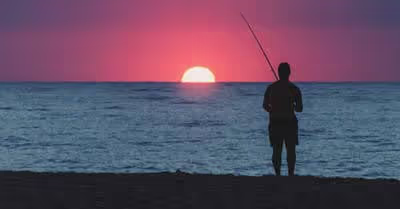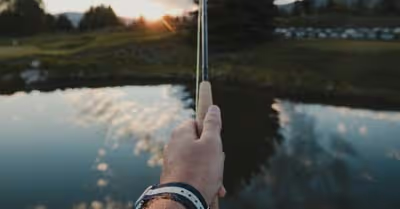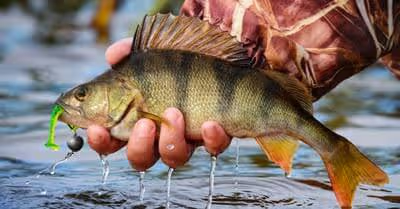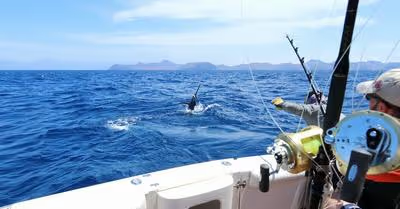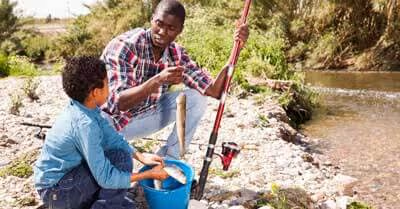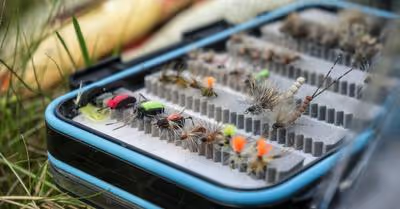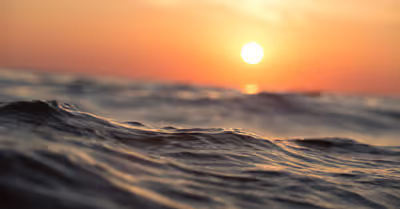Table of Contents
The Relationship between Fish and the Weather
Just like many other animals, fish have a peculiar ability to sense various weather changes. They have a great ability to detect changes in temperature, passing fronts, and changes in air pressure. And while rain may increase your chances of success, it's important to keep in mind how the fish bites will hugely depend on the prevailing weather temperatures and air pressure.
If the temperature is temperate just because it has rained in recent days or weeks, angling just before it rains could be much better. The idea here is that fish are highly sensitive to changes in barometric pressure. Under such conditions, fish will be more active since they're more comfortable and will attempt to maximize their metabolism. That's not all; fish are cold-blooded animals and cannot regulate their body temperatures. For this reason, they'll try finding their optimum sustainability temperature and this generally occurs when it's raining.
Changes in Air Pressure and Oxygen Levels
As we've noted, fish can sense the changes in air pressure and this will affect how they behave. This is why most fish species tend to be more active days leading up to a storm or when there's light rain. As such, you can consider throwing your lines if the weatherman predicts an imminent storm.
The idea here is that fish generally feed more when there's an imminent low-pressure that's brought about by rain. Things can become worse after the rain as the high pressure tends to work against the fish's body and metabolism. You should also keep in mind that the strength of the rain can affect your fishing experience. Fish may fear for their safety when the rain intensifies and may retrieve to the bottom while staying inactive. That being said, it will be a lot better to fish in light rains.
So why is Fishing Better in the Rain?
Apart from all the scientific stuff about how rain affects fishing, there's just something about rain that makes fish more active and ready to bite. When it rains, there's always a run-off that carries all kinds of fish food such as worms and critters into the water body. This increase of food will normally stir fish into a feeding frenzy.
If it's a river, keep in mind that there will be an increase in river flow and the water will become murky and cooler, which can allow fish to move more freely. Rainy conditions may also be ideal when fishing on a lake. This is because many fish species that inhabit lakes tend to be more active under dark conditions than in bright sunlight. Needless to say, it's often cloudy when it's raining and this can be an ideal condition for catching some big fish.
Generally, the amount of dissolved oxygen in a lake or river becomes quite low in hot summer months. This usually makes fish quite inactive and this means that you get almost no bites. So when it pours, the rain will aerate the water surface while having a cooling effect on the water body, thereby making fish more active. You should also remember that rain will disturb the surface of the water body, which can impair the fish's ability to see. This will, of course, increase your chances of sneaking up on the fish because your line won't be visible to the fish.
Here are a few things to always keep in mind:
- Rain carries certain organic matters into the water body, thereby attracting some fish species to come out to feed.
- Insects tend to find their way to the water surface when it's raining or immediately after it rains. Their presence attracts the attention of insect-eating fish species, which then leads to a feeding frenzy.
Tips to Increase Your Success when Fishing in the Rain
Here are the best tips to increase your chances of success when fishing in the rain.
Practice Safety
Safety should always come first in whatever you do. Fishing when it's raining is a great idea but you should never do it if it can put you in danger. In short, you should NEVER fish when there's a storm, lightning, or thunder. You should only go out there when your safety is guaranteed.
Wear Appropriate Clothing
One of the crucial parts of safety that we have to note is your clothing. Well, it's of great importance to wear the right clothes when fishing in the rain or wet weather. Make sure that you wear quality waterproof clothing as it can make a huge difference in being happy and comfy or miserable and dejected. So even if you're fishing when it's raining, make sure that you stay warm and dry, and you'll enjoy this experience.
Check the Tides
Keep in mind that the tides will tend to be higher during storms. This is because the rainwater will increase the volume of the water body and the shores will swell up. For this reason, fish will look for areas where there's water movement such as near inlets, spillways, and drains.
You should, therefore, target these areas as fish will be waiting to take a bite. You can find areas where runoff is coming into the river or lake, especially if it's clean. Again, keep in mind that rain can make the water murkier and denser as they can carry large amounts of mud. Such conditions may be undesirable for fishing and that's why you should look for areas that are clearer and away from the mudflows.
Fish just before the Storm
You will be more successful if you fish just before a storm. This is because the barometric pressure is low, which sends fish into a feeding frenzy just in anticipation of the storm. The idea here is that fish do not know how the storm is going to affect the river or lake and may even make it difficult to get food or feed.
Imagine a situation where we knew three months earlier that Coronavirus would come. Of course, we would have stockpiled and prepared for the pandemic. Surprisingly, fish are just trying to prepare for the worst, so they're trying to get as much food as possible since they do not know how long the storm is going to last.
As such, you can go fishing before the storm. Keep in mind that the frenzied feeding will probably diminish during the storm and might up after the storm when the barometric pressure begins to rise again.
Use Noisy and Colorful Lures
Rain will, of course, make the water murky. This will decrease visibility, which makes it a lot harder for fish to spot your lures. So when selecting the right lures for fishing when it's raining, consider going for brightly-colored baits; lure that can be easily noticed by the fish even in murky waters.
You should also go with lures that make noise. Some of the best lures for fishing when it's raining include popping corks and crankbaits. You can also use bigger lures that are more visible, especially in the absence of sunlight.
Try Topwater Fishing
When it's raining fish are generally more willing to roam and actively pursue bait at the water surface. This is because the water surface is broken up by the raindrops while the clouds are obscuring the sun. As such, it's more likely that the fish will be feeding at the water surface. In addition to fishing at the water surface, you should concentrate on traditional fishing areas such as ledges, ditches, and current seams.
Pick up the Speed
It's more likely that there will be no sun when it's raining and fish will be roaming more than they would when there's bright sunlight. As such, most fish species are more likely to come out of their hiding spots and spread out over a much bigger area. This calls for the need to fish faster.
Make sure that you use a faster fishing tackle that can cover more water in a short time. This is perhaps why you should avoid using spinnerbaits as they tend to be slower. Instead, consider throwing a worm. You should also keep in mind that fish tend to be more active and aggressive when it's raining, so you need not try so hard to lure them into biting.
Recent Articles



